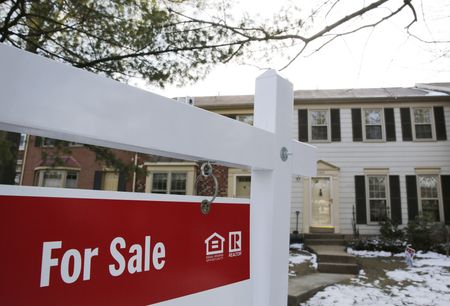By Jonathan Stempel and Mike Scarcella
(Reuters) -The National Association of Realtors agreed on Friday to resolve antitrust litigation accusing brokerages of inflating sales commissions, a settlement likely to bring major changes and lower costs when Americans buy and sell homes.
The $418 million settlement calls for the NAR to eliminate decades-old rules on commissions, and make it easier for buyers to negotiate fees with their own agents or use no agents at all.
These changes could spur more home sales by lowering typical commissions by thousands of dollars, a benefit to less-wealthy individuals and families struggling with inflationary pressures or being priced out of their neighborhoods.
But it may also reduce revenue for traditional real estate brokerages, and make employment less lucrative and appealing to the more than 1 million members the NAR represents.
Real estate brokers earned an average $90,000 a year as of May 2022, about 50% above the national average for all jobs, according to the federal Bureau of Labor Statistics.
TD Cowen analysts expect the settlement could reduce commissions by 25% to 50%. For a typical American home, the median price of which was $417,700 in last year’s fourth quarter, that could mean a potential $12,500 of savings.
The settlement was announced 4-1/2 months after a federal jury in Kansas City, Missouri ordered the NAR and several brokerages to pay $1.78 billion in an antitrust case covering agents in that state. A judge there may triple the damages.
MANY LAWSUITS
Several similar lawsuits have been filed around the country.
Defendants in the litigation have included HomeServices of America, part of Warren Buffett’s Berkshire Hathaway.
Anywhere Real Estate, Compass, Douglas Elliman, Keller Williams and Re/Max are among other brokerages that have been sued.
Share prices for several brokerages fell, including some by double-digit percentages, after the settlement was announced. Some homebuilders’ shares, including Lennar and Toll Brothers, gained on the news.
“Mortgage rates being where they are, this could take a while to normalize and in the meantime put added financial pressure on the residential brokerage industry,” JPMorgan analysts wrote.
Analysts at RBC said the settlement could also benefit CoStar and its Homes.com real estate portal.
The accord requires court approval. It resolves claims against NAR agents, state and local realtor groups, and most smaller brokerages. HomeServices is not part of the settlement.
“They ought to have pressure on them to join the rest of the industry in changing their practices,” said Michael Ketchmark, a lawyer representing plaintiffs in the Missouri case.
A spokeswoman for Berkshire Hathaway Energy, which owns HomeServices, declined to comment. The NAR had no additional comment.
‘SWEEPING’ REFORMS
Sellers had objected to the longstanding practice of paying the combined 5% to 6% commissions for their own agents and for buyers’ agents, with their own agents setting fees for both.
Critics believed sellers should be allowed to list homes on various databases without paying buyers’ agents, with both sides shopping around for the best price.
They have also said the current setup encouraged agents to steer clients toward homes carrying higher commissions.
Under the settlement, home listings on the NAR’s Multiple Listing Service would no longer tell buyers’ agents how much they could expect to be paid.
Buyers’ agents would also have to enter written agreements with their clients. The changes take effect in mid-July.
Cohen Milstein Sellers & Toll, which helped broker the settlement on behalf of opponents of the industry’s practices, said sellers using multiple listing services will no longer have to pay buyers’ agents.
“This settlement will bring sweeping reforms that will help countless American families,” managing partner Benjamin Brown said in a statement.
Not everyone welcomes the changes.
“It will cause confusion for every buyer, seller, broker and agent,” said Judi Desiderio, chief executive of Town & Country Real Estate in East Hampton, New York, where homes routinely sell for millions of dollars.
Some buyers could end up paying more for homes, Desiderio added.
(Reporting by Jonathan Stempel in New York and Mike Scarcella in Washington, D.C.; Additional reporting by Dan Burns in Washington, D.C., Tom Hals in Wilmington, Delaware and Lance Tupper in New York; Editing by Matthew Lewis, Chizu Nomiyama and Alexander Smith, Kirsten Donovan)
